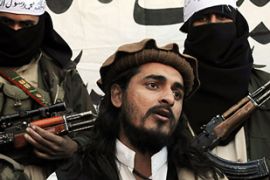Pakistan drone attack ‘kills many’
Taliban leader reportedly targeted in attack that left at least 18 dead.

However, a Taliban spokesman told Pakistan’s Dawn TV that Mehsud was safe and had left minutes before the assault.
Increased attacks
Alan Fisher, Al Jazeera’s correspondent in Pakistan, said the US were likely to view the operations as a “huge success”.
“The use of drone strikes in Pakistan is highly controversial but there’s no sign of the Americans stopping them any time soon,” he said.
“They will regard this latest operation as a huge success – targeting and killing what they say were a number of militants.”
| in depth | |||||||||
|
Mehsud took over as leader of the Pakistani Taliban five months ago, after Baitullah Mehsud, his predecessor, was killed in a similar US drone attack.
The attack was the seventh suspected US missile assault in the tribal district this month.
North Waziristan houses Taliban and al-Qaeda fighters as well as members of the Haqqani network, a powerful group known for staging attacks on foreign troops in Afghanistan.
The US government has called on Islamabad to step up its efforts against Taliban- and al-Qaeda-linked fighters who cross over into Afghanistan.
The Pakistani army recently completed an offensive against the Taliban in South Waziristan, which borders North Waziristan.
The US has increased drone attacks since a suicide bomber crossed over Pakistan’s border and killed seven CIA employees in an attack in eastern Afghanistan on December 30.
Double agent
A video was later released showing Hakimullah Mehsud sitting beside the CIA bomber, a Jordanian double agent, Hammam Khalil al-Balawi, creating the impression that his group played a major role in the second biggest attack on the CIA in its history.
Playing down the extent of US dependence on foreign countries, especially Middle Eastern ones, for intelligence gathering, Robert Grenier, a former CIA station chief in Pakistan who also headed the Iraq Issues Group during the Bush administration, told Al Jazeera: “Frankly, it is very limited. The case of the Jordanian, I think, was an exceptional one.
“Yes, there is a good deal of co-operation among concerned countries [and] that is true of the [rest of the] world.
“But the ability of these services, including those of Arab countries, to operate effectively outside their own borders is very limited.”
